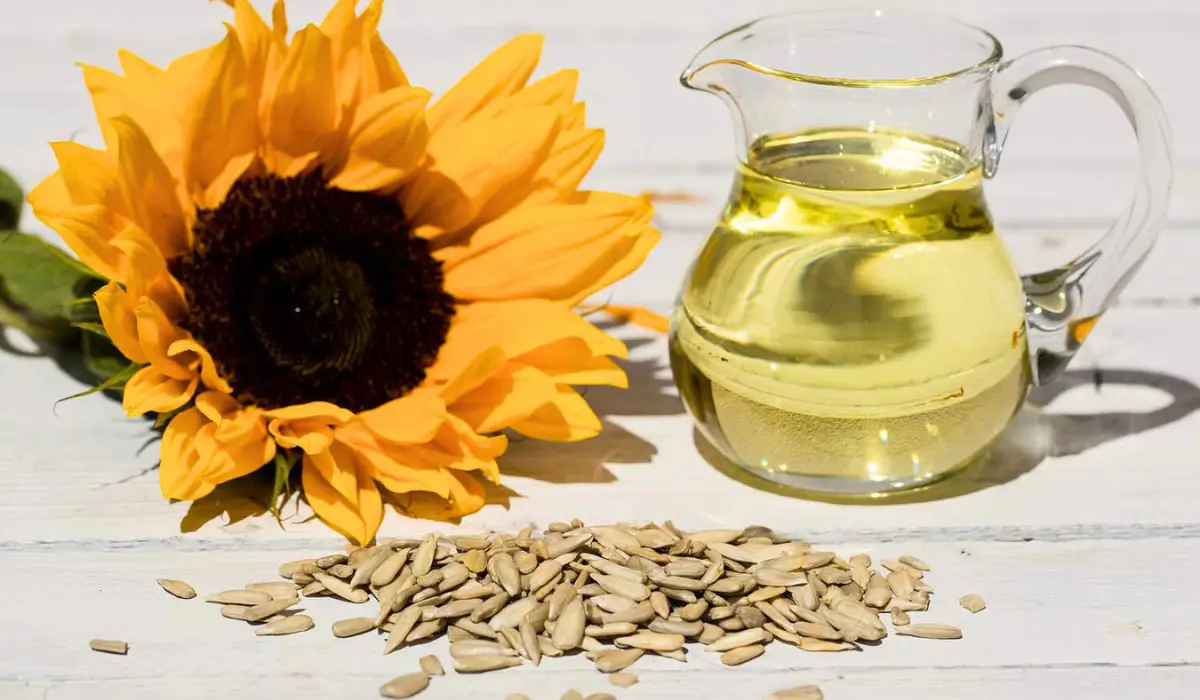Sunflower oil is extracted from the seeds of the sunflower plant and is used globally. With a light taste and high nutrients, this oil is gaining widespread acceptance in homes worldwide. Sunflower oil, used in quite some recipes, is valued for its high smoke point and bland taste, making it suited to various culinary methods. But sunflower oil comes with a downside, too.
Like any product, understanding the benefits and potential drawbacks of each is important. Overconsumption can cause health problems, and there are ecological considerations with its production.
This article explores the various aspects of sunflower oil, its Uses and benefits, and the side effects so that we can avoid them.
Historical Background of Sunflower Oil

Sunflower oil originated in North America and has been used for centuries. Initially, sunflower seeds were considered valuable by indigenous people. But as time passed, more and more attention was centered on the seeds. From them started the extraction of oil. This marked the birth of what we know today as sunflower oil.
Nutritional Value of Sun Flower
Sunflower seeds are packed with various nutrients.
- Healthy Fats: Fat makes up around 51% of the content, most of which are suitable for heart health.
- Protein: They contain around 21% protein, vital for muscle building and repair.
- Fiber: About 9% of their weight is dietary fiber, which is excellent for digestion.
- Vitamins: They are high in vitamin E (over 200% of the daily value) and B vitamins.
- Minerals: Sunflower seeds have about 70% of the daily value for magnesium and 96% for selenium, both essential for bodily functions.
Top Benefits And Uses Of Sunflower Oil
- Cooking: Sunflower oil is admired for its stability at high temperatures in cooking. You can deep-fry or saute with it without breaking down or creating harmful compounds. Compared to oils with lower smoke points, this characteristic makes it healthier as an option.
- Baking: Sunflower oil is often used instead of butter or other fats for baking. It can make the cakes and bread moist and soft without contributing any objectionable taste. This substitution improves the texture and decreases the saturated fat content in the baked products.
- Salad Dressings: Sunflower oil is widely used in salad dressings because of its light consistency and the lack of taste. It goes well with many other flavors and gives healthy and delicious dressings.
- Cosmetic and Medicinal Applications: Beauty and health industries have begun incorporating sunflower oil due to its hydrating properties. Hair and skin care products are improved with the oil.
- Skin Care: Sunflower oil contains significant amounts of the two moisturizing agents, vitamin E and linoleic acid. That is also why these elements make sunflower oil an ideal ingredient in skin cosmetics. Thus, you will often find it in lotions and creams, which help keep the skin moist and protect it.
- Hair Care: The used condition and shininess. Not only is sunflower oil applied to treatments, but It is also available in various hair products, including conditioners and hair masks. It will be less frizzy with the oil, and the hair will be in a better condition.
- Therapeutic Uses: In traditional medicine, sunflower oil has been used for wound healing and skin barrier repairs. It also relieves some skin diseases, like eczema or acne. This agent controls inflammatory processes, and this added ingredient benefits anyone with inflamed skin.
- Prevents Colon Cancer: Sunflower oil is good for preventing cancer like colon cancer. It has a lot of Vitamin E, more than any other cooking oil. Adding it to your meals can protect you from colon cancer. It also has carotenoids, which can stop uterus, lungs, and skin cancers. The Vitamin E in sunflower oil fights off harmful free radicals. These free radicals can harm cells and weaken your immune system.
- Heart Health: The high unsaturated fatty acids in the sunflower oil make it cardiovascular-friendly. This oil is very beneficial for the heart since it lowers the amount of bad fats and also lowers the risk of heart disease.
- Antioxidant Properties: Sunflower oil has vitamin E, which is a powerful antioxidant. Free radicals can do you no damage as long as this vitamin protects the cells in your body. Regular use of sunflower oil in your diet promises a good, long life.
- Anti-inflammatory Effects: It possesses anti-inflammatory characteristics that aid in alleviating bodily inflammation, particularly among those with arthritis.
Also Read: Castor Oil Hair Mask For Damaged Hair: Do They Work?
Potential Side Effects
On the other hand, sunflower oil has more benefits than you might think. Nonetheless, people must also be aware of its possible adverse side effects.
- Allergic Reactions: Abnormal allergic reactions to the oil are sometimes seen in people with sensitivities to sunflower seeds, with symptoms such as skin rashes and itching. Should such symptoms occur, a severe case may develop–anaphylactic shock.
- High Omega-6 Fatty Acids: Sunflower oil is very rich in omega-6 fatty acids. However, surplus consumption can lead to an imbalance in the omega-6 to omega-3 ratio of the body, provoking a risk of inflammation. This lack of balance is tied to inflammation and has been linked to an increased risk of chronic disease.
- The amount of Calories: Sunflower oil is high in calories. One cannot take in too much without becoming fat and suffering from related health problems. Moderation is crucial if you plan to use it in your diet.
Wrap Up
Sunflower oil, a versatile ingredient, is helpful in the kitchen, the beauty shop, and the sick bed. It is known to promote heart health but also possesses moisturizing properties for the skin and hair. While its benefits are not to be underestimated, Sunflower oil should be used sparingly to avoid fat gain and allergic reactions. Then, consider that it is a kind and sustainable source of all types of oil.
No matter what you eat, you need to be aware: balance and awareness regarding all dietary components are vital to receiving many benefits while reducing risks. Sunflower oil is nature’s gift to us, a simple but valuable nutrient that enriches life in numerous ways.

